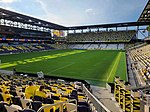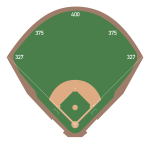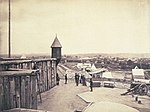Nashville Repertory Theatre
Nashville Repertory Theatre is a professional, Actors' Equity-affiliated regional theatre company based in Nashville, Tennessee. Nashville Repertory Theatre was founded as Tennessee Repertory Theatre in 1985 by Mac Pirkle and Martha Rivers Ingram. The first production was Macbeth. The theatre's original home base for production was the 1100-seat James K. Polk Theater in the Tennessee Performing Arts Center. With an annual budget of more than $3 million, Pirkle emphasized the development of new musicals. Dream, a musical revue based on the lyrics of Johnny Mercer, was developed at Tennessee Rep and had a Broadway run in 1997.After Pirkle's departure from Tennessee Rep in 1999, the leadership of the theatre changed hands frequently. David Grapes was artistic director until 2004, when David Alford took over. In 2007, René Copeland was named artistic director. During this period of transition, Tennessee Rep shifted its production base from the Polk Theater to the 250-seat black box Andrew Johnson Theater, still located within the Tennessee Performing Arts Center. With the production of Sweeney Todd in October 2014, Tennessee Rep was rechristened Nashville Repertory Theatre. Copeland held the artistic director position until her departure in May 2019, after which managing director Drew Ogle assumed leadership. 2021's production of Ragtime marked the Rep's return to the Polk Theater, with the company henceforth producing shows in both the Polk and the Johnson. In 2023 Micah-Shane Brewer was named artistic director of Nashville Rep.
Excerpt from the Wikipedia article Nashville Repertory Theatre (License: CC BY-SA 3.0, Authors).Nashville Repertory Theatre
Southgate Avenue, Nashville-Davidson
Geographical coordinates (GPS) Address Nearby Places Show on map
Geographical coordinates (GPS)
| Latitude | Longitude |
|---|---|
| N 36.13525 ° | E -86.76551 ° |
Address
Central High School
Southgate Avenue
37203 Nashville-Davidson
Tennessee, United States
Open on Google Maps








